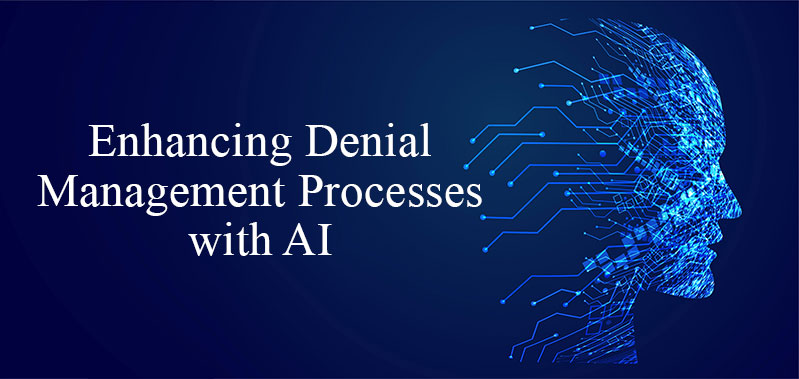
Enhancing Denial Management Processes with AI
Artificial Intelligence has become a game changer in various industries, and from last year's emergence, it has found its way into healthcare. However, the healthcare industry has been tackling several challenges, including medical coding and billing intricacies, workforce shortage, and more. Claim denials of providers and organizations pose significant mounting financial concerns within the healthcare industry.
As per a survey, approximately $25 has been spent while reworking a denial claim. This simply means that reworking denied cases not only takes your precious time but also leads to significant financial losses and reduces workforce efficiency. From several other reports and surveys, it has also been revealed that every year, 5%-10% of healthcare industries are experiencing claim denials, reducing efficient revenue cycle performance.
But do you know process delays tend to claim denials?
More than 30% of healthcare providers are still using manual claims denial management. This highlights that there could be a high chance of coding errors and flaws in the management process. Another major reason for denial is medical coding errors. Incorrect or erroneously assigned medical codes may result in claim rejections, adding complexity to the reimbursement procedure and potentially affecting patient care.
These results emphasize the urgent requirement for more efficient claims management systems and enhanced coding precision, aiming to boost operational effectiveness and revenue generation for healthcare providers. The utilization of AI in healthcare could gradually fade these challenges. Cutting-edge AI technologies, including machine learning and natural language processing, are transforming communication between RCM staff and healthcare insurers, aiming to establish a fully automated transaction process.
The healthcare industry is undergoing a revolution with Artificial Intelligence (AI) and Machine Learning (ML), which are dramatically enhancing medical coding and billing, claim submissions, and denial prevention through advanced automation and data analysis.
AI Deployment to Reduce Claim Denials
The impact of AI in healthcare is umpteen with abundant evidence. It's efficient for both providers and payers. Through AI, healthcare providers can streamline various processes, including coding accuracy, claim management, billing services, and extracting essential information from medical records and payer contracts. Ultimately, it poses a declination of claim denial and boosts revenue.
Despite the indispensable expertise of experienced revenue cycle professionals in resolving and preventing denials, recent trends indicate that denials are occurring more frequently and with greater complexity. AI empowerment enables them not only to prevent denials initially but also to successfully overturn them.
Artificial Intelligence in the revenue cycle can be used in the following ways:
- AI selection models categorize or prioritize items based on predefined criteria, enhancing revenue yields by automating account prioritization. They are a subset of machine learning focused on efficient item selection.
- AI accelerates workflows by automating critical information extraction from diverse sources like claims, medical records, and contracts. This data expedites tasks such as generating draft appeal letters, reducing errors, and enhancing revenue outcomes.
- As denial rates climb and medical billing and coding policies evolve, submitting claims grows more complex, especially for under-resourced providers. AI predicts denial and payment trends, aiding RCM teams in preemptive adjustments and resource allocation.
- AI enhances Revenue Cycle Management by extracting insights from unstructured data, like medical records and contracts, to ensure price accuracy, prevent denials, and secure proper reimbursement, ultimately benefiting healthcare providers.
- As we know, a minute mistake in coding can lead providers in big trouble. With the advent of artificial Intelligence, coders can avail real-time suggestions, reducing potential human errors and providing guidance to use alternative codes with compliance.
Key Strategies to Improve Denial Management Processes
Undoubtedly, AI transforms claims processing beyond automating manual tasks, eliminating guesswork in healthcare claims management. Instead of relying on manual estimation, AI automatically identifies and prioritizes high-value claims, optimizing efficiency for healthcare providers.
Furthermore, there are other alternatives or strategies to which we should pay attention in order to resolve and manage denials that are as follows:
- Strengthen Documentation: Inadequate tracking of denied claims reduces revenue. Continuously enhance documentation practices for long-term benefits.
- Analyze Denial Trends: Quantify and categorize denial trends to address them effectively with data-driven solutions and payer support.
- Take Proactive Measures: Instead of reacting to denials, initiate positive operational changes promptly. Establish a validated process to resolve denials swiftly within a week.
- Foster Payer Collaboration: Collaborate closely with payers to expedite denial resolutions and improve efficiency.
- Perform Audits: Regular audits, as recommended by AHIMA, significantly improve denial and appeal rates. Audit areas include remittance advice, write-offs, and registration quality.
All-in-all, Artificial Intelligence (AI) has the potential to transform the healthcare industry. Claim denial is one of the biggest challenges for healthcare organizations or providers. With the integration of AI, healthcare administrations can improve medical billing accuracy, efficiency of workforce, claim submission, denial prevention, and decision-making. Ultimately, this contributes to better financial outcomes and patient care.





